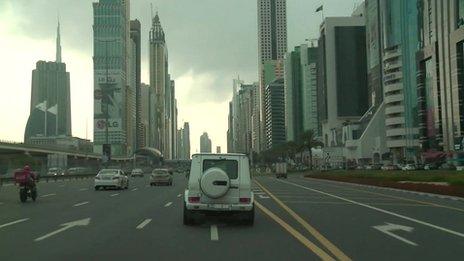BBC road trip with Dubai's Sheikh Mohammed al-Maktoum
- Published
Dubai's ruler, Sheikh Mohammed, takes Jon Sopel to see part of his country
Well, this was a first. The first time I have got into a car and had to call the driver "your highness". But there is a lot about Sheikh Mohammed bin Rashid al-Maktoum that is surprising.
I had met him at the low-rise dun brown house, set around a courtyard, that was the home of his grandfather; the place where the current ruler of Dubai was born. Sheikh Mohammed remembers it as a place with no electricity and no running water. Dubai was a very different place then.
Today the home is a museum, and after a good deal of jaw-dropping from the tourists that a real-life sheikh had dropped in on their sightseeing, I learnt something else important about him.
For a man who does not need to go through that laborious indignity of seeking election or re-election, he is a brilliant "retail politician". He posed for photos, shook hands with all and sundry, and deployed a warmth and easy charm that many a western politician could only dream of.
No burning rubber
From the house, I got into his white 4x4. The registration number is easy to remember: 1. And that means the car is instantly recognisable on Dubai's roads and motorways.
The sheikh likes to drive himself. In a country full of souped-up cars, I wondered whether he would be a fast driver.

The sheikh's car is instantly recognisable on Dubai's roads because of its registration number
Let us put it like this: if he was invited to take a car around the circuit on Top Gear, my guess is no lap records would be broken and there would not be much evidence of burning rubber. It was pleasingly sedate.
Just as well, really, because every couple of hundred yards or so, a car would pull alongside, and the driver would pull out his camera phone while simultaneously trying to steer and take a picture of the sheikh. Now that's what I call a hazardous manoeuvre, and one that the Stig would never have attempted.
He points to a mobile phone in a pocket on the dashboard. This, he explains, is so that anyone can ring him. His phone number is publicised throughout Dubai, and anyone can call if they have a problem.
He also stays in touch via Twitter, boasting an impressive 2.4 million followers. Let no-one accuse him of being out of touch with his citizens.
Bedouin roots
From his grandfather's house, we drove through central Dubai with its skyscraper-lined avenues. The sheikh talked about how his vision of modern Dubai came about.
He said he went to Europe with his father as a child and saw that there were proper roads and buildings, instead of tracks through the desert and tents. Dubai today has infrastructure that would rival the best anywhere in the world.
But for all that, Sheikh Mohammed remains true to his Bedouin roots. The journey took us out into the desert, to his hideaway - a literal oasis where all you could hear was the birdsong.
The day before, when we did a recce of this spot where the interview would take place, there was a noisy fountain. We asked could that be turned off. "No problem," said his man.
But then we noticed the roar of aircraft engines overhead. "Don't worry about that either," said the fabulously helpful minder. "We can turn those off too."
And not one plane flew over us all the time we were there. Now that is what you call power.
Watch Jon Sopel's interview in a BBC News Special on BBC World News on 14 January at 03:30 GMT & 08:30 GMT and on 17 January at 04:30 GMT & 09:30 GMT
- Attribution
- Published13 January 2014
- Published23 November 2013
- Published3 February 2012
- Published21 November 2013